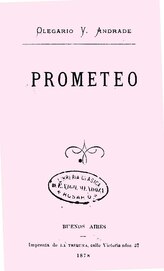Olegario Victor Andrade
Olegario Víctor Andrade (Alegrete, Río Grande do Sul, March 6, 1839 – Buenos Aires, Argentina, October 30, 1882) was an Argentine poet, journalist, and politician of Brazilian origin.
Biography
He was the son of Mariano Andrade, from Santa Fe, who served as justice of the peace, and Marta Burgos (from Entre Ríos). Due to political differences between his father and the government, they must leave Argentina for Brazil, where Olegario, the eldest of three brothers, was born. Shortly after being born, they return to Argentina, where they settle in Gualeguaychú, the city where he would spend all his childhood and youth. He was orphaned of father and mother at a very young age (1847) and took care of his two younger brothers, Wenceslao and Úrsula.
He studied at the Colegio de Concepción del Uruguay, Entre Ríos, where he showed a gift for literature and controversy.
In 1848, at the age of nine, Olegario aroused the attention of the Urquiza delegate, Colonel Rosendo María Fraga, at school due to his ability for literature. His impression leads him to strongly recommend him to the governor, who will immediately ensure the continuation of his studies.
He would be a classmate at the Colegio del Uruguay of great figures who would come to stand out in national political life: Onésimo Leguizamón, Julio Argentino Roca, Victorino de la Plaza, Benjamín Basualdo and Eduardo Wilde among others.
When he finished his official studies, he married the Uruguayan María Eloísa González Quiñones (1857), with whom he had five children: Agustina, considered the main poet from Entre Ríos of the 19th century, Eloísa, Mariano, Olegario and Lelia.
Urquiza, then governor of the province, offered him to travel to Europe to complete his training, along with Juan Bautista Alberdi, who was then minister of the Argentine Confederation. Andrade rejected the offer and dedicated himself to journalism in Entre Ríos.
Since 1859 he stood out for his pen and at the age of 21 he was appointed personal secretary of the president of the Nation, Santiago Derqui. Around that same time he began writing columns supporting the federal cause in El Pueblo Entre Ríos , in Gualeguaychú; In 1864 he founded his own medium, El Porvenir, in which he vehemently criticized Buenos Aires politics and especially the Paraguayan War. In 1866 he published an intelligent pamphlet, titled The two policies: current considerations , where he explained the divergence between the interests of Buenos Aires and those of the interior of the country.
The following year, President Bartolomé Miter ordered the closure of El Porvenir, which motivated Andrade to move to Buenos Aires to publish in El Pueblo Argentino. He collaborated with Carlos Guido y Spano and Agustín de Vedia in the writing of La América , in support of Urquiza's presidential candidacy. He would later direct La Tribuna Nacional , in addition to teaching classical history at the Colegio Nacional in Buenos Aires. In 1878 he was elected national deputy and re-elected three years later.
He was a lyrical and epic poet, although he gave little to publication. His epic works addressed the same themes of national history that he had dealt with as a journalist. Possibly the best verses of him can be found in his works El nido de cóndores and Prometheus .
His remains are in the Recoleta Cemetery, and a bust of him is in the Garden of Poets in El Rosedal in Buenos Aires.
Works
- The nest of condors (1881)
- The lost harp
- Prometheus
- Atlantis
- San Martín (1878)
Essays
- The two policies (1886)
